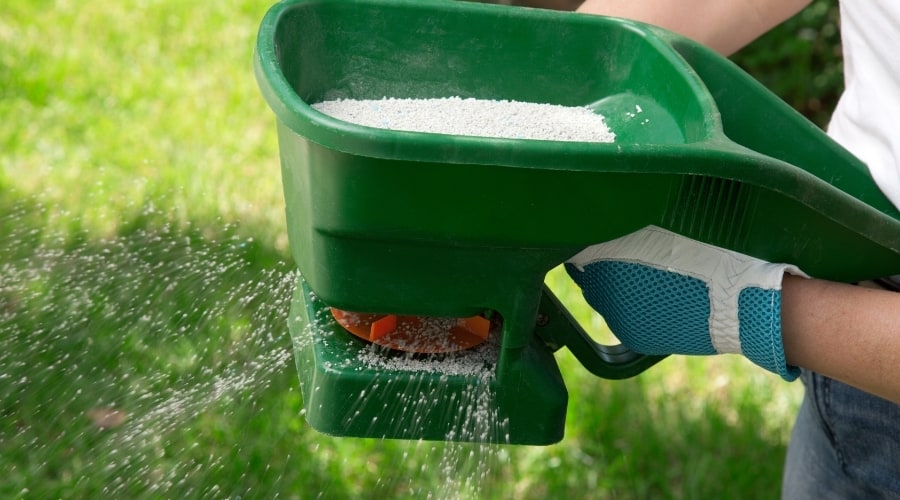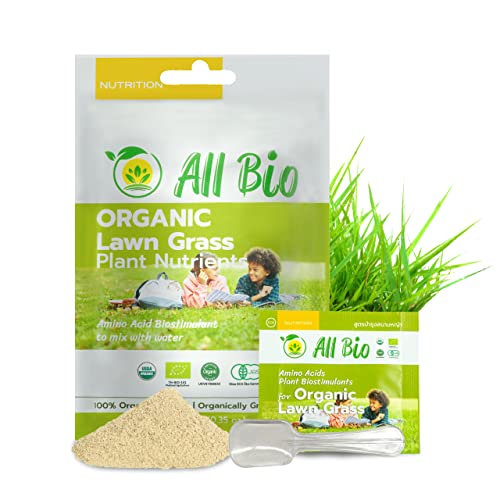If you use Nematodes in your soil or wish to preserve those occurring naturally, you need to know which fertilizers are harmful to Nematodes. The scientific community has hosted multiple studies on fertilizer ingredients to show which are good and which will kill Nematodes.
Lawn fertilizers that are high in Nitrogen, Phosphorus, Sulfur Coated Urea or Iron Phosphate will kill Nematodes in your soil. While it won’t wipe out the entire population of Nematodes, it can decrease their numbers and reduce their effectiveness in providing benefits to the soil.
I wrote this guide to provide useful information about the various kinds of fertilizer and their effect on Nematodes.
Here you’ll find everything you need to know about safe and dangerous fertilizers for Nematodes, and how to get past the conflicting information that some researchers provide about what kills Nematodes and what does not.
Table of Contents
Does Lawn Fertilizer Kill Nematodes
Some, but not all lawn fertilizers can kill some Nematodes. While this answer may sound vague, bear with me. A Chinese clinical study showed that fourteen years of fertilization did not affect the Nematode community in the trials.
However, an Iowa University study discovered that fertilizers containing phosphorus reduced the survival rate of Nematodes.
The Chinese study suggests that fertilizers with nitrogen and phosphorus do not significantly impact Nematode levels over several years. The results show conflicting conclusions that can be confusing.
There are different kinds of Nematodes in the soil. Some chemicals negatively impact some varieties of Nematodes, but not others.
Lawn fertilizer that has chemicals added in the manufacturing process may kill some Nematodes depending on the types of chemicals that are present. To know if a lawn fertilizer is dangerous to Nematodes, you must first know what it is comprised of.
Lawns require three main nutrients including nitrogen, phosphorus, and potassium. Phosphorus is dangerous for Nematodes and high amounts of nitrogen can be too while potassium is not.
Most lawn fertilizers are designed to provide the grass with the nutrients they need. Unfortunately, these are not healthy for most kinds of Nematodes.
Commercial lawn fertilizer that is high in nitrogen increases the activities of bacterivorous nematodes, but it suppresses fungivorous nematode activities.
While it won’t wipe out the entire population of all kinds of nematodes, it can decrease their populations and make them far less effective in providing benefits for the soil.
There are some formulations of lawn fertilizer that are not as dangerous for Nematodes as some others. Organic lawn fertilizer does not kill Nematodes.
To get a better idea of which fertilizers are best for Nematode health, we must look at the various organic formulations with their advantages and disadvantages.
Fertilizer that is compost-based is not harmful to Nematodes because it is made up of organic matter or biomass. The decomposition process is healthy for some Nematodes and allows them to thrive. This is the best kind of fertilizer for Nematode health.
The second-best fertilizers for supporting Nematode reproduction are those which contain cow manure and organic matter versus those with chemical additives.
Some commercial formulations of fertilizers are made with zero levels of phosphorus and varying percentages of nitrogen, phosphorus, and potassium.
- 🌱 NATURALLY MAINTAINING AND PROMOTING HEALTHY LAWN: Revitalized lawn to a thick turf by strengthening the root systems. Promotes a robust root system for a healthier lawn. Help repair thin lawn. Suitable with all grass types including Bermuda, St. Augustine, Zoysia, Buffalo, Centipede, Florida Palmetto, Bahia, Fescue, Ryegrass & Kentucky Bluegrass
- 🐶 SAFE FOR PETS / FAMILY SAFE- Our Lawn Plant Nutrients is safe for use on lawns, trees, shrubs, ponds, and wells. It is also family safe and safe for pets. All ingredients are 100% organic, no chemical or synthetics ingredients.
- 🌱 100% ORGANIC - ecologically safe. “Better for you and better for the planet!” We also called it “Plants Nutrients " that supplement "Fertilizer”, but full of nutrients for your plants and it works amazingly well that we want you all to try!!
- 🌱 SUPER GREAT VALUE - Mix 1 little Spoon (1g) of the recipe that comes in the bag, with 1 liter of water and see great results. To enhance performance, use the 1:1:1 ratio of Product: Growth Booster: Water included in the "How to Use" artwork under "All Bio Tips". In addition, add spraying frequency to see even better and faster results.
- 🌱 EASY TO STORE - All Recipes of All Bio Plant Nutrients is extremely easy to store. Our product comes in a resealable bag, with the actual product being a dry powder form which is light, powerful and long lasting.
Last update on 2024-04-20 / Affiliate links / Images from Amazon Product Advertising API
Lawn Fertilizers That Harm Nematodes
1 – Fertilizer Containing Phosphorus
Phosphorus in lawn fertilizers can have a harmful impact on nematodes in the soil. It inhibits their activities and can decrease the population
2 – Fertilizer Containing High Nitrogen
Although the studies are mixed on the impacts of nitrogen on Nematodes, some studies suggest that some Nematodes show reduced effectiveness after the application of fertilizer containing high amounts of nitrogen in the mix.
However, the effects generally subside within two weeks of application, except for slow-release formulations.
3 – Fertilizer Containing Sulfur Coated Urea
Urea is a natural ingredient often used in lawn fertilizer blends. Urea is not healthy for the Nematode population. It not only reduces the population it can wipe them out.
It’s a type of nitrogen, and when it is coated with sulfur, it has a slow-release characteristic that makes it potent for longer times that can exceed the two weeks recommended for Nematode safety.
4 – Fertilizer Containing Iron Phosphate
Iron Phosphate is an ingredient that is commonly used to kill slugs. It may be added to some fertilizers for the dual purpose of nourishing the grass and killing slugs. It is lethal to Nematode populations.
Does Fertilizer Harm Nematodes
Some fertilizers can harm Nematodes but not necessarily kill them. This depends on the formulation of the fertilizer in terms of its ingredients and the percentages of each ingredient.
In many instances, fertilizer does harm at least some Nematodes, depending on what’s in it and the ratios. High nitrogen formulations will render Nematodes less effective and decrease their overall survival rate.
It seldom wipes out the population, but it can render them useless. Generally, within two weeks, Nematodes are no longer affected by the average regular strength/normal release lawn fertilizer.
Slow-release fertilizers are among the most dangerous for Nematodes. If you apply a slow-release formulation that contains sulfur-coated urea, for example, the fertilizer will continue to disperse harmful chemicals into the soil for longer durations.
The longer the exposure to dangerous chemicals, the more negative the impact on the effectiveness and the survival rates of Nematodes in the soil.
Will Fertilizer Affect Nematodes
All fertilizers will affect Nematodes in some capacity. Fertilizers that contain high levels of nitrogen will weaken Nematodes and reduce their effectiveness.
High nitrogen fertilizers make the ground inhospitable for Nematode growth and development for two weeks from the time of application.
Although nitrogen-rich fertilizers are not good for Nematodes they are not likely to kill all of the nematodes present in your soil.
Phosphorus is also harmful to Nematodes, but you can find some formulations that are free of phosphorus. Compost-based fertilizers that are 100% organic will provide Nematodes with a healthy environment. This is the safest type of fertilizer for Nematodes.
Organic fertilizers such as cow manure or pig manure that are administered without any chemical additives are also healthier for Nematodes than most commercial types with chemical additives.
It is, however, important to note that cow and pig manure do give off nitrates naturally. The absence of other compounds, however, makes it the second-best choice for Nematode health.
Whether positive or negative, fertilizer does have an effect on Nematodes, but there is some disagreement on the intensity of the impacts from the chemicals we’ve discussed.
In general, it’s better to be safe than sorry. Erring on the side of safety can help eliminate the guesswork if preserving Nematodes in the soil is a priority.
Helpful Tips To Know About Fertilizer and Nematodes
Knowledge of how the different types of fertilizers affect Nematode health is essential to protect those microorganisms that are beneficial for plants.
Here are a few tips that are helpful for protecting Nematodes in the soil while providing your lawn and other plants with the nutrients they need to grow and thrive.
- Phosphorus is harmful to Nematodes and should be avoided
- Sulfur-coated Urea is harmful to Nematodes and should be used sparingly
- Commercial fertilizers may be applied to the soil with Nematodes introduced after a period of two weeks has passed
- It’s essential to read the labels on all fertilizers to know the ingredients and the ratios of the ingredients
Final Thoughts
Will Fertilizer Kill Nematodes? Some fertilizers will and some won’t. Many experts recommend only fertilizing plants when it becomes necessary as it is not safe for Nematode health.
However, knowledge of how various fertilizer formulations can affect Nematodes can help you find the best solutions without wiping them out.
Awareness of the potentially harmful ingredients such as sulfur-coated Urea, Nitrogen, and Phosphorus, can help you avoid high concentrations of these compounds in the fertilizers you choose to use.
Many different commercial formulations are available to help protect beneficial Nematodes in the soil.
Additionally, organic fertilizers made of compost materials are generally safe, and even healthy for Nematode activity. This is the best choice for Nematodes.
The second-best choice is a fertilizer that is composed of cow or pig manure; however, these do contain nitrogen that occurs naturally.
Fertilizers that are natural and free of chemicals may cause some effect on Nematodes, but they will not kill them outright.
Waiting two weeks after applying fertilizer to the soil, then introducing Nematodes into the soil is generally considered safe unless the fertilizer is a slow-release type.
Knowledge of the facts about fertilizers and Nematodes can help you to make the best choices.


